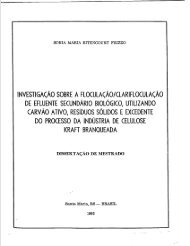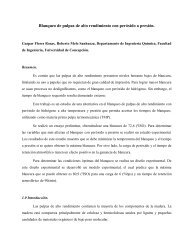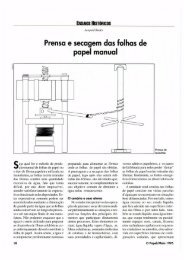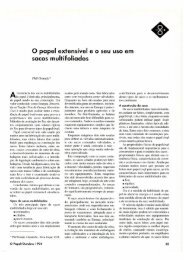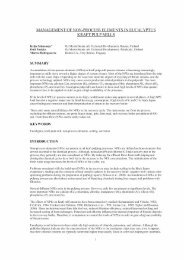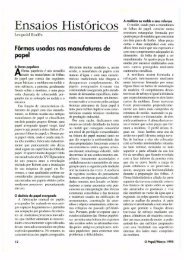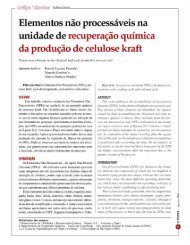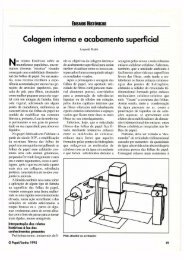O Eucalipto: um século no Brasil (The Eucalypt - Celso Foelkel
O Eucalipto: um século no Brasil (The Eucalypt - Celso Foelkel
O Eucalipto: um século no Brasil (The Eucalypt - Celso Foelkel
Create successful ePaper yourself
Turn your PDF publications into a flip-book with our unique Google optimized e-Paper software.
O objetivo das empresas associadas da ABRAF é, em <strong>um</strong>a década, triplicar a área de<br />
florestas plantadas que, em 2006, chegou a 5.373.417 hectares. Se isso for possível, o <strong>Brasil</strong><br />
terá 15 milhões de hectares plantados <strong>no</strong> início da década de 2.020. Hoje o País já suplanta<br />
a Finlândia, a Rússia e o Chile em florestas cultivadas e virá a suplantar o Canadá, Japão e<br />
encostar <strong>no</strong>s Estados Unidos. É também por isso que o <strong>Brasil</strong> preocupa os produtores de<br />
outros países, o que explica a virulência da campanha contra os eucaliptais brasileiros.<br />
O campo para o crescimento da produção é muito grande, pois o <strong>Brasil</strong> participa<br />
<strong>no</strong> mundo com produção ainda inferior à da Finlândia, <strong>no</strong> que diz respeito a produtos<br />
florestais, embora este país seja pouco maior que o Estado de São Paulo. As vantagens<br />
brasileiras são a temperatura, o índice pluviométrico, a disponibilidade de terras e a tec<strong>no</strong>logia,<br />
sendo que as grandes empresas internacionais do setor já perceberam isso.<br />
“O <strong>Brasil</strong> é a bola da vez para investimentos florestais”, insiste Antônio Oliveira,<br />
e a prova é que já chegaram aqui quase todas as grandes corporações globais do setor<br />
florestal. Quem não chegou, está ultimando os pla<strong>no</strong>s para vir para o <strong>Brasil</strong> e os grandes<br />
Fundos de Capitalização dos Estados Unidos e Europa fazem constantes ofertas para<br />
compra de florestas das empresas brasileiras”, afirma o executivo. Esses Fundos não estão<br />
tendo sucesso, entretanto, e o motivo é simples: as florestas plantadas <strong>no</strong> <strong>Brasil</strong> dão <strong>um</strong>a<br />
boa rentabilidade às empresas e ninguém quer dispor delas.<br />
O rendimento é tão grande que alguns grupos empresariais começam a plantar<br />
florestas, sem ligá-las a indústrias de processamento. Sabe-se que o plantio “per si”, é bom<br />
negócio e, futuramente, pode-se planejar o que fazer com a madeira.<br />
Esta perspectiva de crescimento tende a levar os eucaliptais para as fronteiras<br />
agrícolas. É certo que parte dos 90 milhões de hectares de terras já exploradas e abandonadas<br />
do País poderiam ser em parte ocupadas por florestas. Afinal, o mundo vive <strong>um</strong><br />
momento de grande disponibilidade de capitais e a vocação para o agronegócio é inexorável<br />
<strong>no</strong> <strong>Brasil</strong>.<br />
O E U C A L I P T O - U M S É C U L O N O B R A S I L<br />
98<br />
Triplicar em 10 a<strong>no</strong>s<br />
Three-fold increase in 10 years<br />
<strong>The</strong> goal of the ABRAF member companies is to, in a decade’s period, increase planted<br />
forest areas three-fold which, in 2006, had capped at 5,373,417 hectares. If this is possible,<br />
Brazil will have 15 million hectares planted in early 2020. If today Brazil already<br />
surpasses Finland, Russia and Chile in planted forests, it will also surpass Canada,<br />
Japan and come close to the United States by then. It is also for this reason that Brazil<br />
worries producers in other countries, a fact that explains the virulence of the campaign<br />
against Brazilian eucalypt plantations.<br />
<strong>The</strong> field for production growth is very big, since today Brazil participates in the world<br />
with production that is still smaller than Finland’s insofar as forest products are<br />
concerned, even though Finland is just a little larger than the State of São Paulo. <strong>The</strong><br />
Brazilian advantages are temperature, rainfall, land availability and tech<strong>no</strong>logy, and<br />
the sector’s large international corporations have already <strong>no</strong>ticed it.<br />
“Brazil is the next one up for forest investments,” insists Antônio Oliveira, and the proof<br />
of this is that nearly all major forest sector corporations have already arrived here.<br />
And those that aren’t in Brazil yet are wrapping their plans up to move in, and the<br />
major American and European capitalization funds are making constant offers to buy<br />
forests that belong to Brazilian companies,” said the executive. <strong>The</strong>se Funds have <strong>no</strong>t<br />
been successful, however, and the reason for this is simple: forests planted in Brazil are<br />
profitable for the companies, and <strong>no</strong>body wants to sell them.<br />
<strong>The</strong> profitability is so big that a few business groups have started planting forests without<br />
connecting them to processing industries. Planting itself is a good deal and, in the<br />
future they can plant what to do with the wood.<br />
This growth perspective tends to take eucalypt plantations to the agricultural frontiers.<br />
What is certain is that part of the 90 million hectares of land that has already been exploited<br />
in Brazil may be partly occupied by forests. After all, the world is going through a<br />
moment of major capital availability, and Brazil’s vocation for agribusiness is inexorable.




